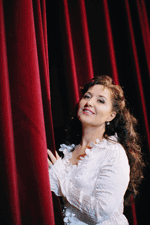> [Archived] Chronicles

A New Prestigious Achievement of Soprano Elena Moșuc
This season, as usual, the Zürich Opera has appealing titles and distributions. During the week March 14th-20th, 2011, I saw, first on March 9th, the fourth show from the nine of the new production Norma by Bellini. The series, which had started on February 27th, marked the debut of our famous soprano Elena Moșuc in the redoutable main role.
Elena Moșuc's Triumph
At the peak of her career, after receiving recognition at La Scala and the Metropolitan Opera, famous worldwide for her bel canto interpretations, Elena Moșuc tackled her role at the height of her professionalism, her knowledge in singing, the deep understanding of the heroine's spirituality and the flawless vocal technique. With a glamorous voice, the soprano marked her artistic presence on her first stage appearance, with the recitative Sediziose voci, in which the heaviness of the word, of the speech and the grave notes resounding from the chest announced an exceptional evening. The reknown cavatina Casta Diva ensued clear invocation, with a wonderful legato. A prayer that left the audience breathless, the explosion of applause and ovations practically interrupted the show. What followed was a string of nuanced phrases, of nimble notes carefully unrolled, of long high notes, of diaphane pianissimos, and more than that. Resolute accents completed the portrait of the main character. For Elena Moșuc, Norma is full of senzitivity and lyricism, a vulnerable heroine, for whom the sacrifice originates in sufferance. The end was astonishing and the artist seemingly wished to leave the spectators with the memory of a melodious painting, high-pitched, endless, a single breath, in pianissimo, "Ah! padre!...un prego ancor" and a infinitely moulded cantilena: "Deh! non volerli vittime". Ten minutes of applause and ovations designated Elena Moșuc's triumph and the success of the evening.
… and other impressions about the interpretation
Roberto Aronica is the baritenore type, baritone tenor, ideal for the role of Pollione, a singer who is, however, limited as far as the heroic approach is concerned. The natural C, the high note of the Meco all'altar di Venere aria, seemed precarious. So did the extremeley high-pitched sounds of mezzosoprano Michelle Breedt, Adalgisa, otherwise with a nice phrasing and nuance intentions. Bass singer Giorgio Giuseppini was distributed for the role of Oroveso.
Facing the routine ansambles of the theater, conductor Paolo Carignani conducted vigurously, carefully, with a good knowledge of measures and expression.
Minimalist set-up, condemnable side-slips
Robert Wilson's setting was abstract, static, essentialized and minimalist. However, the audience could concentrate on the music. But the surprising side-slips', like the apparition of a lion in Pollione's cabaletta in the Pollione-Adalgisa duet, as well as a unicorn and…a humble goat - childish symbols given the context - made it clear to me why, at the premiere, the audience severely condemned the director.
Fidelio - played intensely and convincingly
After two nights, on March 11th, Beethoven's Fidelio was under the spell of Daniele Gatti's baguette. Dinamic modeller of ample sonorities but also a refined man of detail, with cutting gesticulation, but also suggestive arm limbering, the Italian conductor obtained the maximum of success from the orchestra of the Opera, in the "Leonora no. 3" uverture, also upliftingly crafted, and traditionally included before the final scene. Stilistically, the voices were very well chosen. For the part of Leonore, soprano Ricarda Merbeth proved intensely dramatic, but with a vibrato that is dangerous for her future career. As Florestan, Michael König displayed his impressive Heldentenor voice in the exclamation "Gott, welch Dunkel hier!" but the difficult final high note in the aria should have been more attentively adjusted. Laurent Naouri was so violent as Don Pizarro, and Alfred Muff, Rocco, disclosed a beautiful color of smoothly played bass. I noticed tenor Christoph Strehl, very suitable as Jacquino, while soprano Sandra Trattnigg was a scenically delicious Marzelline. The functional staging of Katharinei Thalbach brought the action in the in the inter-war period. The performance was intense and convincing.
Rigoletto with its pros and cons
The following night, on March 12th , instead of veteran Renato Bruson, who was sick, the main role from Verdi's Rigoletto was given to baritone Stefano Antonucci - an unimpressive voice, lacking authority, with high notes of quasi-tenor color and deafly low-voiced notes.
The champion of the high and the marvellous super-high notes was, however, tenor Celso Albelo, the Duke of Mantua, unfortunately with frequent intonation issues and an unpleasant nasal emission in the middle register. Soprano Sen Guo sang decesively Gilda's grace-note passages, she phrased beautifully, emphasizing the moments of tension, despite a small rhythmic accident. In the role of Sparafucile, bass singer Pavel Daniluk.
The presence at the desk of the venerable maestro Nello Santi meant reading in a traditional way, which reminded me of the recorded disk performance of legends like Tullio Serafin or Antonino Votto. Balanced and rigurous measures, a logic of melodic handling, and an even-minded collaboration between the parts. The chords had a spectacular effect, in the transparency of the introduction of the Duke's aria "Ella mi fu rapita" and not only that. Gilbert Deflo's setting was unexpectedly ecclectic, too mixed, nonetheless accompanied by beautiful sets.
A return to triumph
Sunday, March 13th, in the matinee, the fifth performance of Norma. A new vocal achievement of our great artist, in the company of the same colleagues. "Summa cum laude" for Elena Moșuc !
Translated by Teodora Gheorghe and Elena Daniela Radu
MTTLC, Bucharest University














